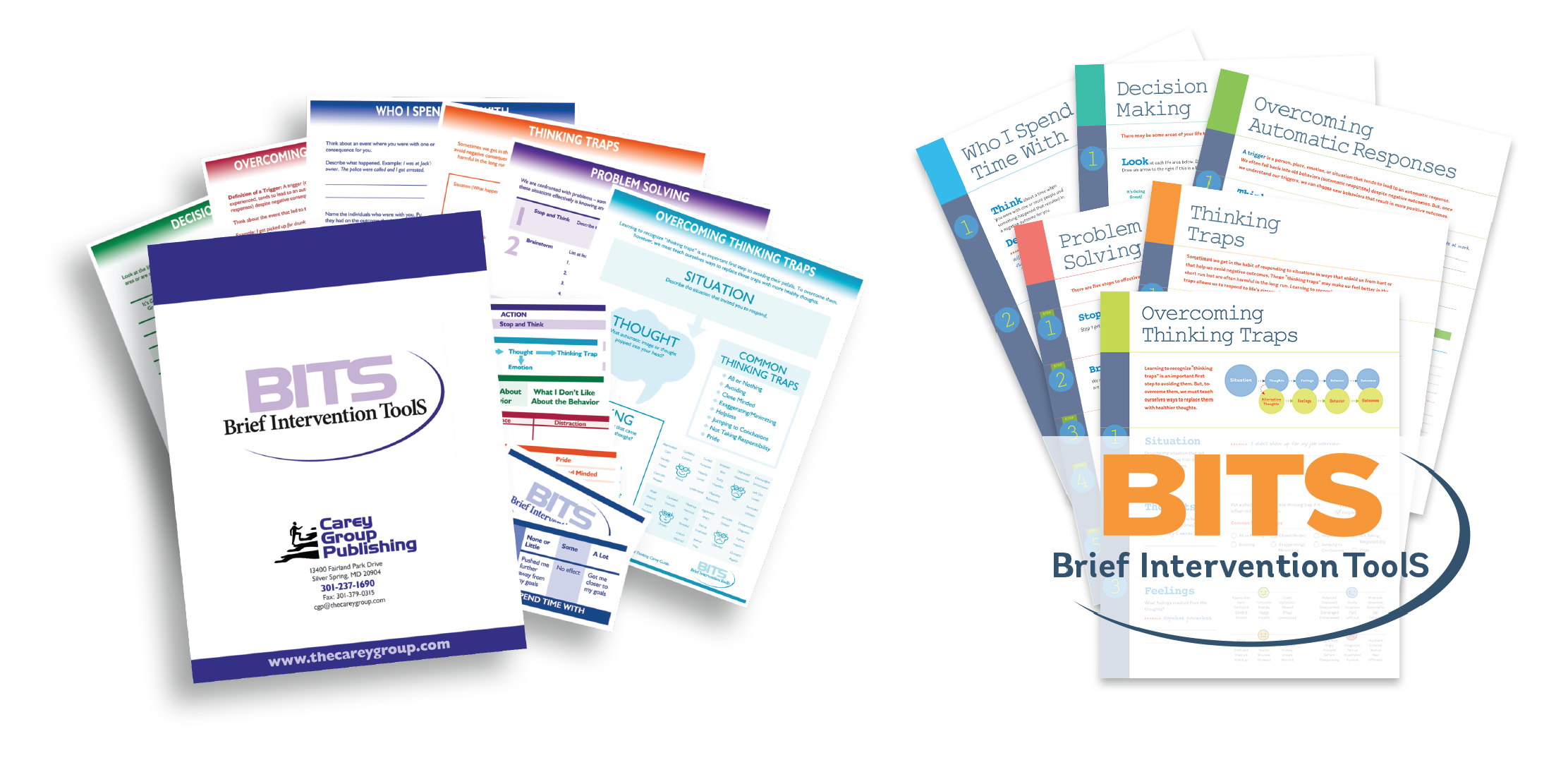While it is true that school suspensions and expulsions are disciplinary actions, they are also disruptions with lasting consequences. When students are removed from the classroom, they miss lessons and opportunities to grow, connect, and build the skills needed for long-term success.
Exclusionary discipline often leads to lower academic achievement, increased dropout rates, and a higher likelihood of involvement with the juvenile justice system. And for students from underserved groups, these consequences are even more significant. While student behaviors require consequences, suspension should not be the only response. Brief Intervention Tools offer an alternative approach that can be used during or after suspension, providing students with opportunities to reflect, learn, and develop better decision-making skills.
Schools need strategies that address student behavior at the source. Cognitive behavioral interventions can offer a proactive way to help improve student behavior.
Overview of Brief Intervention Tools and Their Role in Schools
When students struggle with impulsive decision-making, emotional outbursts, or negative thought patterns, teachers often find themselves caught in a cycle of reactive discipline. But what if there was a way to interrupt these behaviors before they escalate and without resorting to suspension? That's where Brief Intervention Tools (BITS) from Carey Group come in.
Brief Intervention Tools are structured, research-backed solutions designed to support behavioral change in real-time. BITS utilizes one-page cognitive-behavioral worksheets intended for quick, targeted interventions.
Each BITS worksheet helps students recognize the thinking traps, automatic responses, and decision-making habits that drive their actions. These classroom interventions engage students in self-reflection and problem-solving exercises to empower them to take control of their behavior rather than being defined by it.
Brief Intervention Tools target four key areas of student behavior:
- Decision-making: Helping students evaluate choices and consider consequences before acting.
- Problem-solving: Guiding students through logical steps to address challenges productively.
- Automatic response management: Teaching self-regulation to prevent emotional outbursts or knee-jerk reactions.
- Social influences: Encouraging students to reflect on how peers impact their actions.
Integrating BITS into School Behavior Management Systems
A strong behavior management system should focus on prevention, intervention, and support. That's why Brief Intervention Tools fit so seamlessly into modern school discipline frameworks. Rather than waiting for a behavioral issue to escalate, BITS allows educators to step in early, address challenges in real-time, and guide students toward better choices.
Aligning Brief Intervention Tools with Existing Discipline Policies
Many schools already use tiered support models to promote positive behavior and reduce suspensions. BITS naturally complement this system by providing structured, cognitive-based student and classroom interventions at multiple levels:
- Tier 1: Teachers can use BITS proactively with all students to reinforce decision-making and self-regulation skills.
- Tier 2: Students who show patterns of disruptive behavior can engage with BITS in small-group or one-on-one settings as a targeted intervention.
- Tier 3: For students facing chronic behavior challenges, BITS offers individualized support alongside counseling and other specialized services.
Training Educators to Use Brief Intervention Tools
Tools are only as effective as the people using them. Schools must provide training and professional development for teachers and administrators to gain buy-in and make BITS a consistent part of discipline practices.
Educators need to understand when and how to introduce BITS in classroom settings, how to facilitate discussions that encourage self-reflection and accountability, ways to track student progress, and how to adjust interventions accordingly.
Using BITS as Part of Daily School Routines
Brief Intervention Tools can be woven into everyday school life as preventative and responsive measures. Teachers and school counselors can incorporate BITS exercises into advisory periods, morning meetings, or SEL lessons to strengthen students' decision-making skills, help them recognize and overcome thinking traps, develop problem-solving strategies, understand the impact of their social connections, manage automatic responses, and build critical life skills before challenging situations arise.
When students display problematic behavior, a quick one-on-one BITS session can help them recognize the cause, think through consequences, and practice alternative responses.
Administrative Support is Key for Successful Classroom Interventions
For BITS to be successful, school leaders need to champion it. Administrators should:
- Integrate BITS into official discipline policies as an alternative to suspension.
- Provide ongoing coaching and monitoring to maintain consistency.
- Encourage collaboration between teachers, counselors, and support staff to maximize effectiveness.
Research shows that with the proper training and support, BITS can positively shift school culture. It can transform a reactive system into a proactive, student-centered approach that improves behavior without resorting to exclusionry discipline.
The Benefits of Using Brief Intervention Tools to Reduce Disciplinary Actions
Research also indicates that exclusionary discipline like suspension and expulsion does little to correct student behavior and often leads to worse academic and social outcomes. Schools need solutions like BITS to address the root causes of behavioral issues while keeping students engaged.
Reduces the Need for Suspensions and Expulsions
Studies demonstrate that students who receive targeted classroom interventions that teach decision-making and emotional regulation are less likely to repeat negative behaviors. Schools using Brief Intervention Tools report fewer disciplinary referrals for disruptive behavior, lower suspension and expulsion rates due to improved student self-management, and more effective interventions that prevent escalation before discipline is needed.
Enhances Student Behavior and Emotional Regulation
It’s important to remember that self-control isn't always instinctive; it's learned. BITS contributes to this learning by focusing on:
- Self-awareness: Identifying personal triggers and thought patterns.
- Problem-solving: Learning how to approach challenges constructively.
- Emotional regulation: Managing frustration, stress, and impulsivity in a healthy way.
Creates a Positive Learning Environment
Schools that implement Brief Intervention Tools report stronger teacher-student relationships, more engaged learners, and fewer disruptions and conflicts in the classroom.
BITS also complements restorative justice practices and social-emotional learning programs by reinforcing a culture of accountability and growth rather than exclusion.
Impacts Student Success Long-Term
Reducing suspensions can change student trajectories. Keeping students in school and providing structured behavioral support leads to higher graduation rates, better academic performance, and lower rates of justice system involvement in later years.
Advantages of Using BITS Over Traditional Disciplinary Approaches
Traditionally, school discipline has relied on punitive measures like suspensions and expulsions to address misbehavior. But these approaches don't teach students how to make better choices. Brief Intervention Tools provide a better way forward.
Move from Punishment to Skill-Building
While suspensions might temporarily remove disruptions from the classroom, they don't solve the underlying issue. Why did the student act out? What skills do they lack? How can they respond differently next time? Traditional discipline rarely answers these questions.
Brief Intervention Tools take a different approach. Instead of focusing on removal and isolation, students get the opportunity to reflect, adjust, and improve (something punitive discipline fails to offer).
Take a Proactive, Strengths-Based Approach
Discipline should be a learning experience. Brief Intervention Tools encourage classroom interventions that emphasize personal accountability and growth.
When students actively participate in identifying their triggers and restructuring their thought patterns, they're far less likely to repeat negative behaviors.
Improve Teacher-Student Relationships
When teachers have the right tools, they can engage students in meaningful conversations instead of simply issuing disciplinary actions. The structure BITS provides helps teachers guide students toward positive behavioral change.
This guidance strengthens relationships, fosters trust, and creates a classroom environment where students feel supported rather than ostracized.
Experience Classroom Interventions that Take a Smarter Approach to Student Behavior
School discipline doesn't have to mean lost learning time, damaged relationships, or cycles of misbehavior. Brief Intervention Tools offer a practical, research-backed alternative. Schools can reduce suspensions, improve student behavior, and build a culture of accountability and growth by shifting from punitive measures to structured, cognitive-behavioral interventions.
The path forward is clear. School administrators, educators, and policymakers must rethink how discipline is handled. Integrating Brief Intervention Tools into classroom interventions and school-wide behavior management strategies is a necessity. A safer, all-encompassing school environment starts with proactive, skill-building interventions. It starts with replacing outdated punishment models with tools that actually work. It starts with BITS.
Schools that embrace this shift will see fewer suspensions alongside more engaged, more prepared students who are better equipped for long-term success.
Carey Group's evidence-based online training and consulting services address the needs of the justice system and behavioral health professionals. Training is an essential tool for keeping staff, supervisors, leadership, and stakeholders up to date with emerging knowledge and expectations for improved outcomes. Working closely with Carey Group professionals, agencies are better able to offer a mixture of in-person, online, and self-directed courses on evidence-based practices, motivational interviewing, core professional competencies, case planning and management, continuous quality improvement, coaching, and the use of behavior-change tools and supervisor resources. Talk to a Carey Group consultant today to get started!


